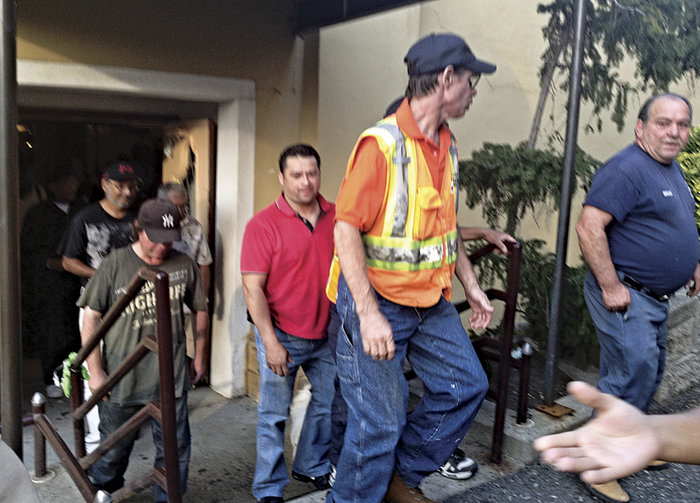“We are in the toughest economic times of our lifetime,” Union City Mayor Brian Stack said Tuesday in response to the fact that the Union City Employees Association (UCEA) has worked without a contract since Dec. 31, 2008. The union has been in negotiations with the city since 2009 and has been thus far unable to reach an agreement.
The UCEA is the union for the city’s Department of Public Works, Department of Recreation and Parks, and the Emergency Medical Service.
“The union knows the economy is bad, and that the mayor has to look out for the taxpayer,” UCEA President Lenny Lucente said after a Monday union meeting. “We understand these things, but in our negotiations we’ve given a lot back, and we need to take care of our workers.”
Since negotiations began, the state passed a law that significantly complicated matters.
In 2011, the state implemented a health insurance payment plan for municipal workers not currently under union contract that would require them to “contribute a percentage of their health care premium or 1.5 percent of base salary, whichever is greater,” according to a letter sent to the city from the New Jersey State League of Municipalities. This law will apply to union workers under contract as soon as their contract expires.
“We’re asking for 17 percent over six years, but the real number comes to about 5 to 6 percent because of what we have to pay back for insurance.” – Lenny Lucente
____________
The maximum percentage was not to be paid all at once, but over a four-year “phase-in” program. The UCEA is currently in their second year of payment, as they were still negotiating their contract at the time the law was passed.
The union may end up signing a contract with the city that increases workers’ pay 17 percent retroactively over six years starting in 2009. But many of the workers’ contributions to their health insurance plan would all but negate that pay increase, Lucente said.
Reality of the raise and part-time employment
“Here’s an example,” Lucente explained. “Someone making $60,000 per year with a 3 percent would in reality only make $5 for the year because of what they’d have to pay in health insurance. Anyone making over that amount really doesn’t get a raise. The gross pay goes up, but take-home goes down.”
Back in 2008, the UCEA had 368 employees, including around 30 part-timers, Lucente said. Now, the total employee count is down to 256 with 92 of those working part-time for $7.25 an hour with no benefits, he said. To combat the economy and to save the city money – as seems to have become a nationwide practice across the industries, municipal or otherwise – the number of part-time employees is increasing as more and more full-timers retire or need to be replaced.
“Of course no one wants to have to pay more for health insurance, and the employees have been very understanding,” Stack said. “But we have been able to avoid layoffs and furloughs and we are committed to maintaining that.”
The fact that an increase in pay means an increase in the amount one has to contribute to health insurance may leave workers with less incentive to stay beyond the 25 years they must work before they can retire.
“So if I were to stay for another two years,” explained Lucente, who has worked in the union office since 1986, “I would be paying almost $11,000 for my health insurance, so why should I stay? It doesn’t make sense.”
The full amount of contributions the state requires workers to pay toward their health insurance kicks in after the four-year phase-in.
Contractual terms
“We’re asking for 17 percent over six years, but the real number comes to about 5 to 6 percent because of what we have to pay back for insurance,” Lucente explained.
He added that they would agree to defer the full retroactive pay until next July when the city renews the budget and would accept the pay owed for 2009, “Just to put something in these guys’ pockets,” he said.
“We will do the best we can,” Stack said. “What we agree to in terms of retroactive pay will be in the best interest of the workers.”
The vacation days would stay the same, accrued gradually over years of employment.
Union concessions
The UCEA has made many concessions to the city to help get the contract signed and work with their economic restraints.
Current workers will receive the same “longevity;” or, the gradual addition of an increasing percentage of the worker’s base salary over years employed. Currently, after two years there is no increase, from three to five years there is a 3 percent increase, and so on until after the 23rd year, when the increase caps out at 21 percent of the base salary.
New hires will get the same incremental salary increases, but it will take longer to earn them.
Another concession relates to what Lucente called “compensation cases.” When a worker was injured on the job, the policy was that they could stay on the payroll for up to 12 months with pay and benefits. The new contract would allow them to stay on the payroll for 9 months, but keep benefits for 12.
Employees’ co-pays for doctor’s visits and prescription medication will increase. Also, in the past, employees who used no sick days were given a $200 bonus at the end of the year, but with the new contract, they will no longer receive any compensation for unused sick days.
“These guys do a great job out there for us,” Stack said. “The state is involved in the negotiations because the city receives transitional aid [financial support for cities in distress]. We’ve sent the proposals to the state, we’re waiting for them to sign off, and we are anxious to resolve this sooner rather than later.”
Gennarose Pope may be reached at gpope@hudsonreporter.com
